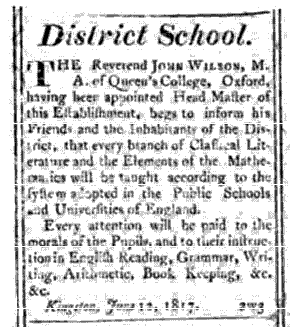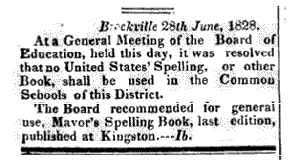School Days
A graduate of Queen’s College, Oxford, the Reverend John Wilson, M.A. was ambitious. In his new position as headmaster of the Midland District Grammar School, he wanted his school to emulate the education received in English public schools and universities. He placed an advertisement to that effect in the Kingston Gazette on 14 June 1817.
The next year George Baxter (1797 – 1869), Wilson’s assistant, offered evening classes at the school in reading, writing and arithmetic at $1 per month and $1 per quarter for fire and candles. He also offered a course in bookkeeping.
When Macdonald entered the school, Wilson was no longer the headmaster. He had resigned as of 1 January 1825 to return to England, and was replaced by Baxter. It was under Baxter that John A wrote his cyphering book. George Baxter may have kept the English system of learning mathematics through the composition of a cyphering book, but he also introduced an American element to his system. Some large chunks of Macdonald’s cyphering book were taken from an American textbook by Nicholas Pike with smaller chunks from another American textbooks by Ferdinand Hassler. About the time John A was writing his cyphering book there was a more general reaction against American educational influence. A report in the Kingston Chronicle for 30 August 1828 is an example of this reaction.


Baxter had a completely different background from Wilson. Born in Dundee, Scotland, family tradition has him destined for the Presbyterian ministry, unlike John Wilson, who was a priest in the Church of England. According to the same tradition, Baxter also obtained a degree from Queen’s College, Oxford. The problem with family tradition is that, at the time, those who did not subscribe to the Thirty-nine Articles of Religion of the Church of England could not enter Oxford; they could enter Cambridge but could not take a degree. Baxter does not appear in the alumni lists for either Oxford or Cambridge. He may have gone to Edinburgh, which did train Presbyterian ministers. He is not in the published rolls of students at the University of Glasgow or at the University of Aberdeen
After the beginning of the rebellion in Upper Canada early in December 1837, the school trustees in Kingston called a meeting and asked all those who condemned William Lyon Mackenzie, one of the key players in the rebellion, to stand up. Baxter did not and was dismissed from his position; Mackenzie was his brother-in-law. The school saw a new headmaster appointed in January 1838.
Baxter returned to his farm and later entered business. He was secretary-treasurer of the Kingston Building Society from its incorporation in 1847. He also participated in 1851 with Macdonald in trying to revive the Wolf Island, Kingston and Toronto Railroad Company.


